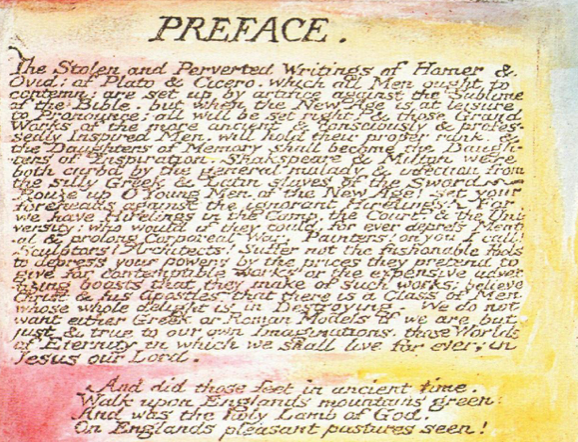Today on My Poetic Side we take a look at the hymn Jerusalem which is based on the poem by William Blake and a few of the misconceptions about it.
Jerusalem Misconceptions

For over a century Jerusalem the hymn has been thought off as the unofficial national anthem of England. It was considered confusing to those who around when it became prominent and it is still confusing people today. A recent report in Prospect Magazine aims to debunk the myths.
Jerusalem is often heard during the Last Night of the Proms and was also heard during the Olympics in 2012, and if you listen carefully you will find mention of it in a whole host of other places.
The poem was originally written by William Blake as part of Milton, his epic poem. And is full of wonderful phrases that people remember like “arrows of desire”, “dark Satanic mills” and of course “And did those feet in ancient times” – phrases many have heard but couldn’t begin to follow with the next line. Many people have over the years interpreted the poem as something patriotic in rather than the political and religious work that It is believed Blake intended. This is quite possibly because it was set to music during the First World War.
Whichever way you “read” the hymn there is a sense of something very English to it that is instantly recognisable.
It is felt that there are four questions asked by the poet in Jerusalem, asked in quick succession they are each answered no. The first one of these questions relates to the possibility that Jesus may have travelled to Britain to trade copper. However, the myth that Jesus might have in fact visited Roman Britain was not created until 1895 which was some time after Blake had died. So, whilst it was originally believed that the poem referred to Jesus it was, in fact, was speaking about Joseph of Arimathea.
It is certainly known that Blake himself was tried by the judges of George III in 1804 for the act of sedition – he had spoken out against the King and his soldiers in a heated row with a soldier in the garden of his cottage. He was scathing about both and the fact that Jerusalem is now such a popular choice of hymn at royal occasions would have been astonishing to him. Blake never intended Jerusalem to be popular with the establishment, far from it was his rallying cry against the powers that ran the country.
The music for the hymn as we now know it was commissioned by Robert Bridges the then poet laureate and it was first performed in 1916 for the Fight for Right organisation. Parry, the composer, who was heavily influenced by German music was not happy with the message of the group and was quick to distance himself, giving copyright of the hymn to one of the leading suffragettes of the time. It has since been used for a variety of different occasions and has become the hymn that everyone knows without perhaps knowing all the words. Words which perhaps do not quite mean what we actually believe them to mean.


You must register to comment. Log in or Register.